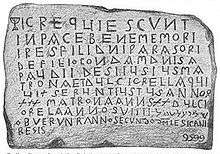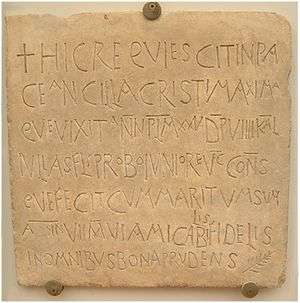Rest in peace
The phrase "Rest in peace", RIP, from Latin Requiescat in pace (Classical Latin: [rekʷiˈeːskat in ˈpaːke], Ecclesiastical Latin: [rekwiˈeskat in ˈpatʃe]) is sometimes used in traditional Christian services and prayers, such as in the Catholic[1], Lutheran,[2] Anglican and Methodist,[3] denominations, to wish the soul of a decedent eternal rest and peace.
| Part of a series on |
| Christianity |
|---|
 |
|
|
|
It became ubiquitous on headstones in the 18th century, and is widely used today when mentioning someone's death.
Description
The phrase dormit in pace (English: "he sleeps in peace") was found in the catacombs of the early Christians and indicated that "they died in the peace of the Church, that is, united in Christ."[4][5][6] The abbreviation R.I.P., meaning Requiescat in pace, "Rest in peace", continues to be engraved on the gravestones of Christians,[7] especially in the Catholic, Lutheran, and Anglican denominations.[8]
In the Tridentine Requiem Mass of the Catholic Church the phrase appears several times.[9]
To satisfy a vogue for rhyming couplets on tombstones, the phrase has been parsed ungrammatically as:[10]
Requiesce
cat in pace
This verse has been found inscribed in Hebrew on gravestones dating from the 1st century BC, in the graveyard of Bet Shearim. It speaks of the righteous person who died because he could not stand the evil surrounding him. A recapture of these words, read as "come and rest in peace", has been transferred to the ancient Talmudic prayers, in a mixture of Hebrew and Aramaic of the 3rd century AD. It is used to this day in traditional Jewish ceremonies.[11]
Other variations include "Requiescat in pace et in amore" for "May she rest in peace and love", and "In pace requiescat et in amore". The word order is variable because Latin syntactical relationships are indicated by the inflexional endings, not by word order. If "Rest in peace" is used in an imperative mood, it would be "Requiesce in pace" (acronym R.I.P.) in the second person singular, or "Requiescite in pace" in the second person plural.[12] In the common phrase "Requiescat in pace" the "-at" ending is appropriate because the verb is a third-person singular present active subjunctive used in a hortative sense: "May he/she rest in peace."
History

The phrase was first found on tombstones some time before the fifth century.[13][14][15] It became ubiquitous on the tombs of Christians in the 18th century,[8] and for High Church Anglicans, Methodists,[16] as well as Roman Catholics in particular, it was a prayerful request that their soul should find peace in the afterlife.[7] When the phrase became conventional, the absence of a reference to the soul led people to suppose that it was the physical body that was enjoined to lie peacefully in the grave.[17] This is associated with the Christian doctrine of the particular judgment; that is, that the soul is parted from the body upon death, but that the soul and body will be reunited on Judgment Day.[18]
In 2017, members of the Orange Order in Northern Ireland called on Protestants to stop using the phrase "RIP" or "Rest in Peace".[19] Wallace Thompson, the secretary of the Evangelical Protestant Society, said on a BBC Radio Ulster programme that he would encourage Protestants to refrain from using the term "RIP".[20] Thompson said that he regards "RIP" as a prayer for the dead, which he believes contradicts biblical doctrine.[21][22] In the same radio programme, Presbyterian Ken Newell disagreed that people are praying for the dead when they use the phrase.
Image gallery
- This Lutheran Christian grave reads "Rest in Peace" in the local Cieszyn Silesian Polish dialect.
 The epitaph R.I.P. on a headstone in a churchyard of Donostia-San Sebastián
The epitaph R.I.P. on a headstone in a churchyard of Donostia-San Sebastián Excerpt from gravestone in Święciechowa, showing R.I.P
Excerpt from gravestone in Święciechowa, showing R.I.P- This cross from 1720 bears the complete Latin phrase in its plural form ("Requiescant in pace")
 This funerary tablet from 525 AD begins with the phrase
This funerary tablet from 525 AD begins with the phrase Requiescat, oil on canvas painting by Briton Rivière, 1888, Art Gallery of New South Wales.
Requiescat, oil on canvas painting by Briton Rivière, 1888, Art Gallery of New South Wales.
Linguistic analogues
Phrases in other languages:
- Afrikaans: Rus in vrede
- Albanian: U prehtë në paqe (P.N.P.)
- Arabic: ارقد في سلام (Urqud fī salām); more common - الله يرحمه (Allah yarħamhu - for males) or الله يرحمها (Allah yarħamhā, for females).
- Armenian: Հանգչիր խաղաղութեամբ (Hangch’ir khaghaghut’yamb)
- Azerbaijani: Allah Rəhmət eləsin
- Basque: Goian Bego (G.B.)
- Belarusian: Спачывай у спакоі (Spačyvaj u spakoi)
- Bengali: তোমার আত্মার শান্তি কামনা করি (Tomar Aantmar Shanti Kamona Kori)
- Bosnian: Počivaj u miru
- Bulgarian: Почивай в мир (Pochivaj v mir)
- Catalan: Descansi en pau (DEP)
- Cebuano: Pahulay sa Kalinaw (PSK)
- Chechen: Dala gech doila (DGD)
- Chinese: 安息 (Mandarin: Ān xī, Cantonese: ngon1 sik1, Hakka: ôn sit)
- Church Slavonic: Црⷭ҇ствїе Нбⷭ҇ное (
- Croatian: Počivao/počivala u miru.
- Czech: Odpočívej v pokoji
- Danish: Hvil i fred
- Dutch: Moge hij/zij in vrede rusten
- Esperanto: Ripozu pace (R.P.)
- Estonian: Puhka rahus
- Faroese: Hvíl í friði
- Finnish: Lepää rauhassa
- French: Repose en paix (R.E.P.)
- Georgian: ცხონდეს, ღმერთმა აცხონოს (May God grant him/her eternal life)
- German: Ruhe in Frieden
- Greek: Αναπαύσου εν ειρήνη ([anaˈpafsu en iˈrini])
- Hebrew: תהא נשמתו (נשמתה) צרורה בצרור החיים (Hebrew pronunciation: [teˈhe niʃmaˈto (niʃmaˈta) tsruˈra bitsˈror haχaˈjim]) (Lit. May his (her) soul be bound up in the bond of life) (תנצב"ה)
- Hindi: दिवंगत आत्मा को शांति (Hindi, India) {divangat Atma ko shanti}
- Hungarian: Nyugodjon békében
- Icelandic: Hvíli í friði (H.Í.F.)
- Irish: Ar dheis Dé go raibh a (h)anam (Lit. On God's right may his/her soul be)
- Italian: Riposi in pace (R.I.P.)
- Japanese: 安らかに眠れ (Yasuraka ni nemure)
- Kazakh: Jatqan jeriń jaıly bolsyn (Jatkan jering jayly bolsyn)
- Kannada: ಮೃತರ ಆತ್ಮಕ್ಕೆ ಶಾಂತಿ ಸಿಗಲಿ (Mrutara Atmakke shanti sigali) (Kannada, India)
- Konkani: ಸಾಸ್ಣಚೊ ವಿಶೇವ್ (Konkani, India) {Sasnacho Vishev}
- Korean: 삼가 고인의 명복을 빕니다 (Samga goinui myeongbogeul bimnida)
- Kurdish: به ئارامی بمریت
- Kyrgyz: Жаткан жери жайлуу болсун (Jatqan jeri jayluu bolsun)
- Latvian: Dusi mierā
- Lithuanian: Ilsėkis ramybėje or Amžiną atilsį
- Macedonian: Почивај во мир (Pochivaj vo mir)
- Malay (including Malaysian and Indonesian): Berehat/Beristirahat dengan Tenang (B.d.T.), Bersemadilah dengan aman
- Maltese: Strieħ fis-sliem, Strieħ fil-paċi
- Marathi: मृतात्म्यास शांती लाभो {mrutatmyas shanti labho}
- Mongolian: Гүн эмэгнэл илэрхийлье (Gün emegnel ilerkhiiliye)
- Nepali: दिवङ्गत आत्माको चिरशान्तिको कामना
- Norwegian: Hvil i fred
- Persian: روحش شاد (Roohash shaad)
- Polish: Spoczywaj w pokoju, but more usually Świętej pamięci abbreviated to Ś.P., meaning holy memory, is used
- Portuguese: Descanse em Paz
- Romanian: Odihnească-se în pace
- Russian: Покойся с миром ([pɐˈkojsʲə sˈmʲirəm])
- Pre-reform: Покойся съ миромъ
- Scottish Gaelic: Gus am bris an là (lit. Until the day breaks)
- Serbian: Почивај у миру., romanized: Počivaj u miru
- Sinhala: සමාදානයේ සැතපේවා (Samādānayē Sătapēvā)
- Slovak: Odpočívaj v pokoji
- Slovene: Počivaj v miru
- Spanish: Descanse en paz/Que en paz descanse (D.E.P./Q.E.P.D.)
- Swedish: Vila i frid
- Tagalog: Sumalángit Nawâ (S.L.N., “In heaven may [he/she/they] be”)
- Tajik: ҷояш ҷаннад шавад (dʒojaʂ dʒanat ʂavad)
- Tamil: பிரிந்த ஆத்துமா சாந்தி அடையட்டும் (Tamil, India) {Pirinta āttumā cānti adayattum}
- Telugu: వెళ్ళిపోయాడు ఆత్మ శాంతి (Telugu, India) {Veḷḷipōyāḍu ātma śānti}
- Thai: ขอให้ไปสู่สุคติ
- Turkish: Huzur içinde yatsın
- Ukrainian: Спочивай з миром
- Upper Sorbian: Wotpočuj w měrje
- Urdu: امن سے آرام
- Uzbek: Joying jannatdan bolsin
- Venetian: C'a repoxe'n paxe
- Vietnamese: Hãy An Nghỉ
- Welsh: Gorffwys mewn hedd
- Xhosa: Lala Ngoxolo
References
- Catholic Prayers in Spanish and English. Harvard University Press. 1900. p. 45.
- Kurtz, Benjamin (1860). Lutheran Prayer Book. T. Newton Kurtz. p. 124.
- Langford, Andy (1 December 2010). Christian Funerals. Abingdon Press. p. 56. ISBN 9781426730146.
- Yaggy, Levi W.; Haines, Thomas Louis (1886). Museum of Antiquity: A Description of Ancient Life—the Employments, Amusements, Customs and Habits, the Cities, Places, Monuments and Tombs, the Literature and Fine Arts of 3,000 Years Ago. Law, King & Law. p. 885.
- Tuker, Mildred Anna Rosalie; Malleson, Hope (1900). "Introduction to the Catacombs". Handbook to Christian and Ecclesiastical Rome: The Christian monuments of Rome. A. and C. Black. p. 411.
Dormit, he sleeps, as an expression for death is proper to Christianity. Dormitio, in somno pacis, dormivit are therefore very frequently found. These and the expression Dormierit in Domino (may he sleep in the Lord) are to be seen especially in loculi of the II. and II. centuries, and occur in S. Agnese.
- Leahy, Brendan (2012). His Mass and Ours: Meditations on Living Eucharistically. New City Press. p. 53. ISBN 9781565484481.
Signs such as "RIP" (Rest in Peace) on the tombs of the early Christians did not just mean they died "peacefully" but that they died in the peace of the Church, that is, united in Christ in the Church and not apart from it.
- Mytum, H. C. (31 December 2003). "Christian Denominations". Mortuary Monuments and Burial Grounds of the Historic Period. Springer Science & Business Media. p. 139. ISBN 9780306480768.
- Tarling, Nicholas (16 May 2014). Choral Masterpieces: Major and Minor. Rowman & Littlefield Publishers. p. 87. ISBN 9781442234536.
- Holy See (1961), Graduale Romanum, 1961 Edition by the Benedictines of the Solesmes Monastery, Desclée, pp. 94*–112*
- Francis Edward Paget (1843), A tract upon tomb-stones, p. 18
- El male rachamim
- Expert: Maria – 7/31/2009 (2009-07-31). "Experts on Latin phrase". En.allexperts.com. Archived from the original on 2012-07-13. Retrieved 2014-04-17.
- Spencer Northcote (1878). Epitaphs of the Catacombs During the First Four Centuries. London: Longmans, Green. p. 79.
- The Church of England magazine. Church Pastoral-aid Society. 1842. p. 208.
- Robert Jefferson Breckinridge, Andrew Boyd Cross. "Antiquity of the Religion". The Baltimore literary and religious magazine. 3. p. 206.
- Gould, James B. (2016-08-04). Understanding Prayer for the Dead: Its Foundation in History and Logic. Wipf and Stock. p. 58. ISBN 9781620329887. Retrieved 2017-07-25.
- Joshua Scodel (1991), The English poetic epitaph, Cornell University Press, p. 269, ISBN 978-0-8014-2482-3
- Karl Siegfried Guthke (2003), Epitaph culture in the West, p. 336
- Edwards, Rodney (2017-07-20). "Orangemen warned to 'reject Rome' and not use RIP on social media". The Impartial Reporter. Retrieved 2017-07-25.
- William Crawley (2017-07-24). "Protestants should not use the phrase 'RIP', Orange Order says". BBC Radio Ulster (Podcast). Talkback. Retrieved 2017-07-24. Segment begins at 42:20 into the podcast, and ends at 1:00:11.
- "Orange Order calls on Protestants not to use the phrase 'RIP'". BBC News. 2017-07-24. Retrieved 2017-07-24.
- Thompson, Wallace (2013-12-15). "Why Protestants Should not Use 'RIP'". Truth Tracts.
The redeemed do not need our prayers, and the lost cannot benefit from them once they have passed from us. We would be better to pray more for them while they are alive.